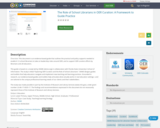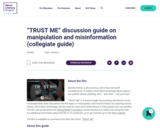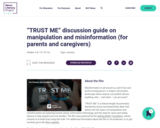
English Language/Arts > Multiple Literacies > Digital Citizenship
- Subject:
- English Language Arts
- Material Type:
- Teaching/Learning Strategy
- Date Added:
- 04/27/2022

English Language/Arts > Multiple Literacies > Digital Citizenship

After more than 30 years in prison and an historic election that for the first time in the nation's history included all citizens regardless of race, Nelson Rolihlahla Mandela became President of the Republic of South Africa on May 10, 1994. This Teacher's Guide includes resources for teaching about the brutality of apartheid, the resilience of the nation's people, the leadership of Nelson Mandela, and primary source materials that will inform discussion about the country's emergence in the world.

This wiki page documents the Projection Investigation Activity done during San Francisco Unified School District's SLANT workshop on January 29, 2011. Projection information, Julia Marshall's 5 Ways to Integrate, and links are provided, as well as the introductory Improv Activity "Advertising Team" which stretches the imagination to design something for the future. The Projection Investigation Activity begins with research around a scientific theme, then brainstorming and prototyping design ideas around that theme, and finally writing a narrative to present the prototype.

Though this unit takes several weeks to complete, for this particular lesson, which is the beginning phases of the project, students will select 6 different genres (they will eventually write) on a central topic of their choice; research and provide evidence/information to support analysis, reflection and creativity; and collect, synthesize, and organize information using a graphic organizer or symbols to assess how/where to best use in project.(Product description).
Here is the direct link to the Google Doc: Multigenre Resarch Project: Beginning Phase

This document is an evidence-based guide that outlines the practical and policy supports needed to enable K-12 school librarians to take on leadership roles around OER, and to support OER curation efforts by librarians and all educators.
This guide is based on a study led by ISKME (iskme.org) in collaboration with Florida State University's School of Information. The study is titled “Exploring OER Curation and the Role of School Librarians". ISKME designs guides and toolkits that help educators navigate and implement new teaching and learning practices. Grounded in research, our evidence-based guides and toolkits help articulate what actually works in real education settings—and are tailored to the unique professional learning needs of our clients and their stakeholders.
The study was made possible in part by the Institute of Museum and Library Services (www.imls.gov), under grant number LG-86-17-0035-17. The findings and recommendations expressed in this document do not necessarily represent those of the Institute of Museum and Library Services.

Second grade students in Boston, MA created a professional-quality music video as a culmination of an interdisciplinary study of snakes. Their song, based on Lady Gaga’s hit “Born This Way,” was written by students, and the video became a viral phenomenon. This film features the video and gives the backstory of the video through an interview with the teacher. It focuses on two themes: how students overcome their fears, and how standards can be joined to discovery, joy, and beautiful work. Illuminates CCSS ELA standards W.2.7, W.2.1, W.2.2, W.2.3, W.2.5, W.2.8, W.2.6, (All of CCSS for Writing for second grade).

The following sound recording analysis worksheet was designed and developed by the Education Staff of the National Archives and Records Administration. You may find this worksheet useful as you introduce sound recordings as primary sources of historical, social and cultural importance.

Misinformation is all around us, and it has real-world consequences. In today’s information landscape where anyone can publish almost anything, who — and what — can you trust?
“TRUST ME” is a feature-length documentary directed by Oscar-nominated Roko Belic that delves into the topics of manipulation and misinformation by exploring human nature, information technology, and the need for news and media literacy to help people trust one another.
The guide is intended for adult learners in all settings, such as colleges, correctional facilities and community forums. Leaders should adapt, adopt and adjust these recommendations and ideas as they see fit.
The discussions we recommend are broken up into three sections: before viewing, during viewing and after viewing to help you establish, and build on, the core concepts in the film and reflect on the questions that result. Extension and further reading opportunities are listed at the end of the guide.

The guide is intended for parents and caregivers to aid in discussing the film with their families or other caregivers. They should adapt, adopt, and adjust these recommendations and ideas as they see fit.
The discussions we recommend are broken up into three sections: before viewing, during viewing and after viewing to help you establish, and build on, the core concepts in the film and reflect on the questions that result. Extension and further reading opportunities are listed at the end of the guide.

This site contains curated resources related to teaching digital literacy and digital fluency.

An overview of the Common Core research techniques to address Common Core research standards.

The K-5 Text Analyses includes an analysis of every central text used in the EL Education Language Arts Curriculum, focusing on four specific qualitative aspects of complexity: meaning, structure, language features, and knowledge demands. This document includes text analyses for grade 4.

The K-5 Text Analyses includes an analysis of every central text used in the EL Education Language Arts Curriculum, focusing on four specific qualitative aspects of complexity: meaning, structure, language features, and knowledge demands. This document includes text analyses for grade 5.

The K-5 Text Analyses includes an analysis of every central text used in the EL Education Language Arts Curriculum, focusing on four specific qualitative aspects of complexity: meaning, structure, language features, and knowledge demands. This document includes text analyses for grade 4.

Don’t be S-s-scared: The Truth About Snakes was a six-month long learning expedition, during which second grade students became scientists, musicians, authors, and artists. They experienced the joys of the natural world and the pride of creating high-quality work about a topic that mattered deeply to them. From the start of the expedition, students aspired to be young herpetologists, scientists who study snakes and other reptiles.The expedition was written by teacher Jenna Gampel and published by EL Education.

FreeReading is an open source instructional program that helps educators teach early literacy. Because it is open source, it represents the collective wisdom of a wide community of teachers and researchers. FreeReading contains Writing Activities, a page of activities to address important writing skills and strategies.

EL Education created these K-5 rubrics based on an analysis of the grade-level demands of the CCSS, rubrics used by PARCC and Smarter Balanced, and EL Education's own professional expertise (including attention to the Writing for Understanding framework). The downloads for grades 3-5 includes Writing Rubrics, Informal Checklists, and the Phonics and Word Recognition Checklist.

EL Education created these K-5 rubrics based on an analysis of the grade-level demands of the CCSS, rubrics used by PARCC and Smarter Balanced, and EL Education's own professional expertise (including attention to the Writing for Understanding framework). The downloads for grades 3-5 includes Writing Rubrics, Informal Checklists, and the Phonics and Word Recognition Checklist.

EL Education created these K-5 rubrics based on an analysis of the grade-level demands of the CCSS, rubrics used by PARCC and Smarter Balanced, and EL Education's own professional expertise (including attention to the Writing for Understanding framework). The downloads for grades 3-5 includes Writing Rubrics, Informal Checklists, and the Phonics and Word Recognition Checklist.

The following document analysis worksheet was designed and developed by the Education Staff of the National Archives and Records Administration. You may find this worksheet useful as you introduce students to written documents.